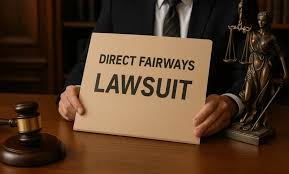Direct Fairways Lawsuit

The Direct Fairways LLC Lawsuit: What Businesses Need to Know
Introduction
The Direct Fairways lawsuit has become a significant topic among small business owners and marketing professionals. The case revolves around allegations that the company engaged in unfair or deceptive advertising practices while providing marketing services to golf-course associated businesses. This article will break down what the lawsuit is about, what the key allegations are, and what businesses should consider if they were clients or are contemplating working with similar firms.
Background: What is Direct Fairways?
Direct Fairways is a marketing firm based in Tempe, Arizona. The company’s business model involved offering advertising space to small local businesses (e.g., real-estate agents, service providers) through marketing assets at golf courses — such as yardage books, scorecards, or signage. (LawyersInventory)
The pitch: access to affluent golf-course audiences and premium placements. However, the way the contracts were sold and the way services were delivered have been under scrutiny. (lawhubx)
What the Direct Fairways Lawsuit Alleges
Here are the main categories of allegations in the Direct Fairways lawsuit:
1. Misleading or Deceptive Sales Practices
Clients claim that Direct Fairways misrepresented either its relationships with golf courses or the scale of exposure their ads would receive. For example:
- Sales reps allegedly said their ad would appear in high-traffic publications or in association with prominent clubs, when that turned out not to be the case. (BlogBuz)
- Time-limited urgency claims (e.g., “spots filling up fast”) that pressured businesses into quick decisions. (GlowsMagazine)
2. Unauthorized Billing and Hidden Fees
A big part of the case involves billing practices:
- Some small businesses say they were charged unexpectedly, such as recurring charges despite agreeing to what they believed was a one-time fee. (BBB)
- Others allege additional undisclosed fees or automatic contract renewals that weren’t clearly explained. (lawhubx)
3. Failure to Deliver Promised Services
Clients allege that after paying, the promised advertising wasn’t delivered, or was delivered in a much inferior form than what was promised:
- Ads that never appeared, or appeared in locations/demographics far removed from what was sold. (BlogBuz)
- Delays so long or lack of proof of placement that clients feel the contract terms were breached. (The Legal Center)
4. Labor and Classification Issues
Beyond client complaints, there are also claims from former workers:
- Some allege they were treated like employees but classified as independent contractors, denying them benefits and protections. (Tech Fanzine)
Who Is Affected & Why It Matters
- Small business advertisers: Those who signed contracts expecting specific advertising value may be affected by the Direct Fairways lawsuit if they believe the value was misrepresented or services not delivered.
- Golf courses: Some have raised concerns that their name or reputation was used by Direct Fairways without proper authorization, leading to reputational risk. (sanfordchamber.org)
- The industry at large: The case draws attention to marketing-services firms that sell “niche” ad products (like golf course placements) and may prompt more scrutiny of how deliverables are defined and contracts managed. (The Barchart)
What to Do If You Think You’re Affected
If you believe you may be impacted by the Direct Fairways lawsuit (or similar marketing agreements), here are key steps to consider:
- Gather all documentation: Contracts, emails, invoices, payment records, artwork proofs, any communications from the company. These can serve as evidence.
- Review your contract carefully: Look for terms around billing (one-time vs recurring), placement guarantees, cancellation/renewal policies, refund provisions.
- Reach out to the company: Before filing formal action, contact Direct Fairways (or its legal counsel) in writing to express your concerns and request resolution or refund. Keep records of attempts.
- Seek legal or regulatory advice: Depending on your jurisdiction and the nature of the issue (unauthorized billing, misrepresentation), you might have rights under consumer protection laws or contract law.
- Check for class-action status: The Direct Fairways lawsuit may already be consolidated or moving toward settlement. If so, you may be eligible to join or participate. According to reports, the case includes hundreds of plaintiffs. (The Legal Center)
Possible Outcomes & Implications
- Refunds or settlements: If the company is found liable or opts to settle, affected businesses might receive partial refunds or credits.
- Operational changes: The company may be required (via settlement or court order) to revise its contracts, billing disclosures, or sales practices.
- Precedent for marketing firms: The Direct Fairways lawsuit could influence how similar firms operate, especially regarding transparency and deliverable verification.
- Increased caution among businesses: Small advertisers may become more skeptical of “special” ad placements and insist on written proof of deliverables before payment.
Final Thoughts
The Direct Fairways lawsuit serves as a cautionary tale for businesses engaging in niche advertising services. The promise of targeted exposure can be appealing — but clarity in contracts, documented deliverables, and transparent billing are essential. If you suspect you’ve been adversely affected by the practices cited in the lawsuit, now is the time to act: gather evidence, understand your rights, and consider whether you may wish to participate in legal recourse.
Frequently Asked Questions (FAQ) About the Direct Fairways Lawsuit
1. What is the Direct Fairways lawsuit about?
The Direct Fairways lawsuit centers on allegations that the marketing company used deceptive or misleading sales tactics, charged clients without proper authorization, and failed to deliver promised advertising services. Some former employees also claim they were misclassified as independent contractors.
2. Who filed the Direct Fairways lawsuit?
The lawsuit includes multiple plaintiffs — mostly small business owners who purchased advertising packages from Direct Fairways. Some complaints have also been reviewed by consumer protection agencies and the Better Business Bureau (BBB).
3. What kind of businesses were affected?
Most of the affected businesses are small, local companies — such as real estate agents, contractors, and service providers — that bought golf course advertising through Direct Fairways. They were told their ads would appear in materials like scorecards, signage, or yardage books.
4. Where is the Direct Fairways lawsuit being handled?
The case and related complaints are primarily associated with Arizona, where Direct Fairways is headquartered. However, since clients came from across the U.S., several states have received similar complaints or reports about the company’s practices.
5. What are the main allegations in the case?
The primary claims include:
- Misrepresentation of advertising exposure or partnerships with golf courses.
- Unauthorized or recurring billing.
- Failure to deliver contracted services.
- Potential employee misclassification.
6. Is there a class action lawsuit against Direct Fairways?
As of the most recent updates, multiple individual and potential class-action claims have been filed. These cases may be combined depending on court proceedings and the number of affected plaintiffs.
7. Has Direct Fairways responded to the allegations?
Direct Fairways has not publicly admitted wrongdoing and may contest the claims in court. Like many companies facing lawsuits, they have the opportunity to present evidence or settle out of court.
8. Can affected businesses get a refund or compensation?
If the court rules in favor of the plaintiffs or if a settlement occurs, affected clients could be eligible for refunds, credits, or damages. Businesses should keep all proof of payments, contracts, and communication with Direct Fairways in case they need to file a claim.
9. How can I find out if I’m part of the lawsuit?
You can check whether your name or business is included by:
- Contacting the law firm or legal team managing the case.
- Checking public court records in Maricopa County, Arizona or federal case listings.
- Visiting consumer websites or forums discussing the Direct Fairways lawsuit.
10. What should businesses learn from this case?
The Direct Fairways lawsuit highlights the importance of:
- Reading and understanding every clause before signing a contract.
- Asking for written proof of advertising deliverables.
- Avoiding pressure to make quick decisions over the phone.
- Using traceable payment methods and keeping detailed records.



